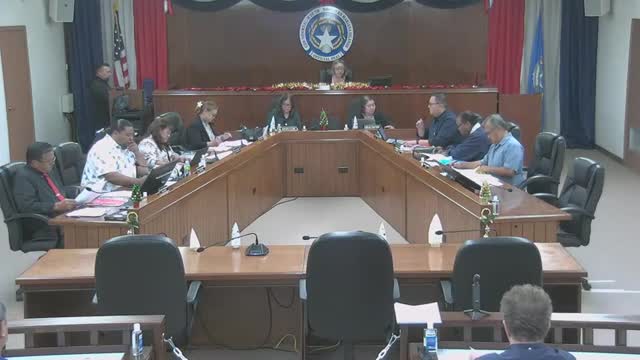Senate passes surtax on large nonresidential construction, adopts floor amendments to split revenue among districts
Get AI-powered insights, summaries, and transcripts
Subscribe
Summary
On Jan. 3, 2025, the Senate passed House Bill 23-120 HD1 SS1 as amended, imposing a 3% surtax on gross revenues from nonresidential construction projects costing $350,000 or more and changing how revenue is apportioned among senatorial districts. The measure passed the Senate by a 7–1 vote.
The Senate passed House Bill 23-120 HD1 SS1 as amended on Jan. 3, 2025, adopting a 3% surtax on gross revenues derived from nonresidential construction projects that cost $350,000 or more. The motion to pass the bill as amended carried on a 7–1 vote in the Senate.
The bill reached the floor after the Committee on Fiscal Affairs reported on House Bill 23-120 in standing committee report 23-122. On the floor, Senator Donna Manglona offered a multi-part floor amendment that changed the distribution of revenues from the special gross revenues from qualifying construction projects (GRQCP) account. As stated on the record, the amendment would: (1) appropriate 2.5% each to the first and second senatorial districts to the municipal department of finance under the expenditure authority of the respective resident department head, and appropriate 15% to the third senatorial district to the department of finance under the expenditure authority of the secretary of finance; and (2) for the portion described as part 2 of the 80%, appropriate 15% each to the first and second senatorial districts to the municipal department of public works under the expenditure authority of the respective resident department head, and appropriate 50% to the third senatorial district to the department of public works under the expenditure authority of the secretary of public works. Senator Manglona also moved that legal counsel and the senate clerk be allowed to make non-substantive technical edits to effectuate the amendment’s intent prior to transmittal.
During floor discussion senators asked whether the amendment language would function like existing earmarking mechanisms (for example, the hotel occupancy tax) and whether the House would accept the late amendment. Senator Paul Manglona asked about the risk that the amendment would not be accepted by the House. Senator Donna Manglona said the bill’s author in the House had agreed to move the House’s session in order to consider the bill if it passed. Senator Jude Hofschneider asked whether the amendment’s language would create an automatic pass-through allocation or if it would still require appropriation; legal counsel advised that the legal effect depends on the specific language and the author’s intent. Several senators asked that the amendment be clarified to make appropriation mechanics explicit; members discussed mirroring the mechanism used for the hotel occupancy tax and the budget act, which still requires appropriation in the commonwealth budget or a specific appropriation bill.
After a short recess to consider technical language, the Senate adopted the floor amendment and then passed House Bill 23-120 HD1 SS1 as amended. The clerk recorded seven senators voting yes and one senator voting no. The transcript records the adoption and the roll call result; individual roll-call votes beyond the aggregate were not clearly recorded in the transcript excerpt.
The bill as passed by the Senate includes the floor amendment’s changes to the GRQCP account distribution and authorization for non-substantive technical edits by counsel and the clerk. No further action on transmittal or House consideration is recorded in the transcript excerpts provided.
